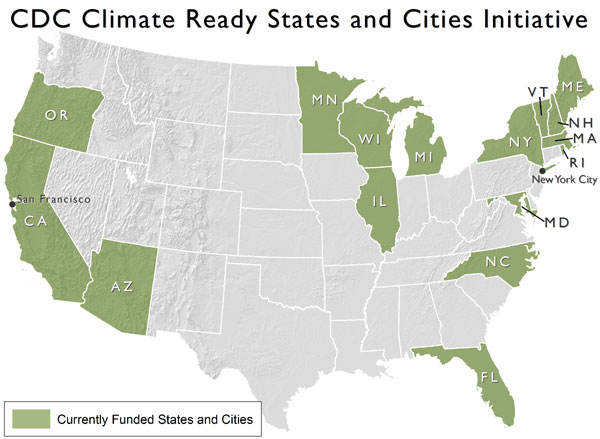Public Health Response to a Changing Climate
 The changing climate endangers human health. Learn what CDC is doing to prevent and adapt to the possible health effects of climate change.
The changing climate endangers human health. Learn what CDC is doing to prevent and adapt to the possible health effects of climate change.
The environmental consequences of climate change are happening now and are expected to increase in the future. Signs of a changing climate include:
- sea-level rise,
- changes in precipitation causing flooding and drought,
- heat waves,
- more intense hurricanes and storms, and
- poor air quality.
These climate changes will affect human health both directly and indirectly.
Addressing the health effects of climate change is challenging. The issue is broad and complex. CDC’s Climate and Health Program works to prevent and adapt to the possible health effects of climate change. The program identifies the populations most vulnerable to these impacts, predicts future trends, creates systems to detect and respond to emerging health threats, and designs programs to manage health risks now and in the future. The climate change funding for CDC represents the only U.S. Government investment dedicated to preparing our nation to anticipate and adapt to the health effects linked to climate change.
CDC funds the Climate-Ready States and Cities Initiative to strengthen the capabilities of state and local health agencies to deal with the challenges associated with climate change. Through CDC funding and technical support, sixteen state and two city health departments are applying advanced methods to address the health effects of climate change. As the nation's lead public health agency, CDC is using its prevention expertise to help state and city health departments investigate, prepare for, and respond to the health effects of a changing climate.

Another CDC-funded program engages climate change observers in Alaska. Over the last several decades, Alaska has warmed twice as fast as the rest of the country. Dozens of Alaskan natives have become part of the sentinel surveillance system, created by the Institute for Circumpolar Health Studies at the University of Alaska Anchorage. They document changes in weather, harvesting, and food and water safety. They also record health changes, such as shellfish poisoning caused by "red tide" algae blooms. In addition, Alaskan villagers are being trained to collect data on temperature and precipitation in eight communities. In isolated villages, some effects of climate change may have gone unnoticed by the scientific world, but this study could help fill in those gaps.
CDC has also developed an Extreme Heat Communication Toolkit. As a result of the changing climate, heat waves are expected to become more severe and more frequent, particularly in the northern latitudes. The toolkit is designed to provide information for older adults, people with chronic medical conditions, children, the homeless or poor, outdoor workers, and athletes at risk of heat sickness. Learn more about how to protect yourself from heat related illness.
For more information on CDC’s Climate and Health activities, please visit www.cdc.gov/climateandhealth.
Get email updates
To receive email updates about this page, enter your email address:
Contact Us:
- Centers for Disease Control and Prevention
1600 Clifton Rd
Atlanta, GA 30333 - 800-CDC-INFO
(800-232-4636)
TTY: (888) 232-6348 - Contact CDC-INFO



